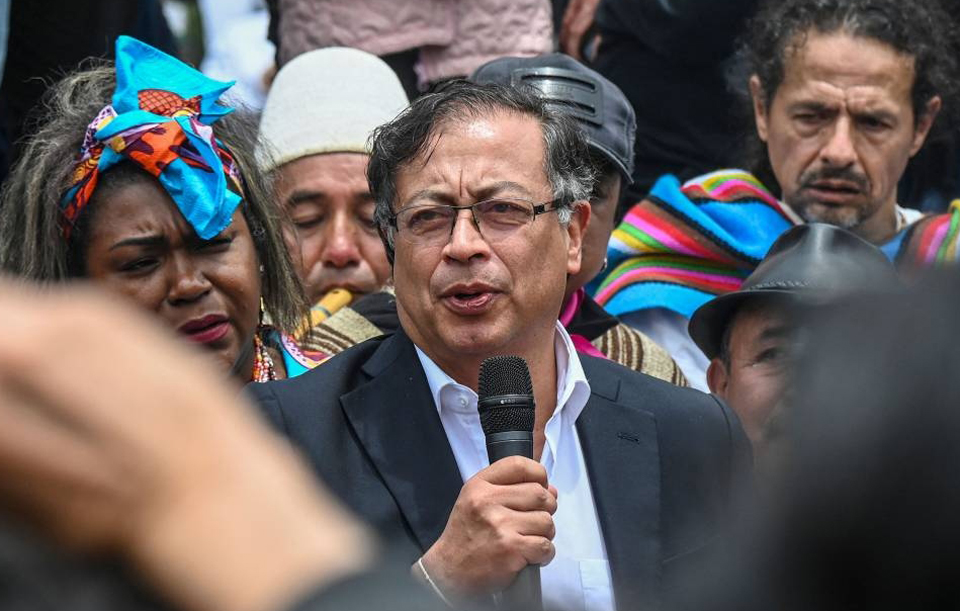
BOGOTA, Aug 8 (NNN-AGENCIES) — Colombia’s first leftist president was sworn into office Sunday, promising to fight inequality and heralding a turning point in the history of a country haunted by a long war between the government and guerrilla groups.
Sen. Gustavo Petro, a former member of Colombia’s M-19 guerrilla group, won the presidential election in June by beating conservative parties that offered moderate changes to the market-friendly economy, but failed to connect with voters frustrated by rising poverty and violence against human rights leaders and environmental groups in rural areas.
Petro is part of a growing group of leftist politicians and political outsiders who have been winning elections in Latin America since the pandemic broke out and hurt incumbents who struggled with its economic aftershocks.
The ex-rebel’s victory was also exceptional for Colombia, where voters had been historically reluctant to back leftist politicians who were often accused of being soft on crime or allied with guerrillas.
A 2016 peace deal between Colombia’s government and the Revolutionary Armed Forces of Colombia turned much of the focus of voters away from the violent conflicts playing out in rural areas and gave prominence to problems like poverty and corruption, fueling the popularity of leftist parties in national elections.
Petro, 62, has promised to tackle Colombia’s social and economic inequalities by boosting spending on anti-poverty programs and increasing investment in rural areas. He has described U.S.-led antinarcotics policies, such as the forced eradication of illegal coca crops, as a “big failure.” But he has said he would like to work with Washington “as equals,” building schemes to combat climate change or bring infrastructure to rural areas where many farmers say coca leaves are the only viable crop.
Petro also formed alliances with environmentalists during his presidential campaign and has promised to turn Colombia into a “global powerhouse for life” by slowing deforestation and taking steps to reduce the country’s reliance on fossil fuels.
Eight heads of state attended Petro’s inauguration, which was held at a large colonial-era square in front of Colombia’s Congress.
Stages with live music and big screens were also placed in parks across Bogota’s city center so that tens of thousands of citizens without invitations to the main event could join in the festivities. That marked a big change for Colombia where previous presidential inaugurations were more somber events limited to a few hundred VIP guests.
The former senator, 62, takes over from the deeply unpopular Ivan Duque for a four-year term during which he will enjoy support from a left-leaning majority in Congress.
Colombian presidents serve only one term.
Petro’s hard-fought victory in June elections brought Colombia, long ruled by a conservative elite, into an expanding left-wing fold in Latin America that could be consolidated in October with a likely victory for Luiz Inacio Lula
da Silva in Brazil.
At a ceremony in Bogota on the eve of his inauguration, Petro said his government would aim to “bring to Colombia what it has not had for centuries, which is tranquility and peace.”
“Here begins a government that will fight for environmental justice,” he added.
On the campaign trail, Petro had promised to raise taxes on the rich, invest in health care and education, and reform the police after a brutal crackdown on anti-inequality protests last year that was internationally condemned.
He has vowed to suspend oil exploration, to promote clean energy and to reactivate diplomatic and commercial relations with the government of Nicolas Maduro in Venezuela, suspended since 2019.
Petro starts from an “enviable position, with a large majority in Congress and, in terms of the street, with support that no government had in recent years,” analyst Jorge Restrepo of the Resource Center for Conflict Analysis (Cerac) said.
Petro’s presidency is historic in another sense, too: by his side will be the country’s first-ever Afro-Colombian woman vice-president, environmental and women’s rights activist Francia Marquez, 40.
The pair will grapple with an economy reeling from the coronavirus pandemic, a spike in violence and deep-rooted anger at the political establishment that culminated in last year’s protests.
Almost 40 percent of Colombia’s 50 million people live in poverty, while 11.7 percent are unemployed.
Inflation reached 10.2 percent year-on-year in July.
On Monday, a preparatory commission set up by Petro said he was inheriting “a level of indebtedness and fiscal deficit that… is critical.”
Petro, who in his youth was a member of the M-19 urban guerrilla group, has promised to implement outstanding provisions of the 2016 peace agreement that saw the rebel FARC movement lay down arms after nearly six decades of civil conflict.
The former mayor of Bogota has also vowed to pursue negotiations with the National Liberation Army (ELN) armed group.
Despite the FARC disbanding to become a political party, Colombia has seen a surge in violence as thousands of dissidents battle the ELN and powerful cartels for control of drug fields, illegal gold mines and lucrative smuggling routes.
According to the Indepaz peace research institute, there are 90 armed groups with some 10,000 members active in Colombia, the world’s largest cocaine producer.
Petro has proposed allowing armed groups to hand themselves over in exchange for some form of amnesty. — NNN-AGENCIES




